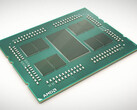Intel has enjoyed a virtual monopoly in the server CPU arena for some time. However, AMD's EPYC series of processors, based on the latest iteration of Zen architecture, may change that. The first generation of these chipsets, Naples, managed to reduce Intel's market share to 99% shortly after its launch. This may sound less than impressive, but in a billion-dollar industry, it was possibly quite valuable to AMD.
The latest report on the server market by DRAMeXchange indicates that Intel's share is down to 98% by now. This represents a 100% improvement for AMD. Furthermore, the analysts estimate that the release of EPYC Rome-based silicon will result in further gains. They will ultimately result in a total market share of 5% for these CPUs by the end of 2019.
AMD owes its new level of success in server-grade business to the uptake of EPYC chipsets by clients such as AWS, Ali and Baidu. These customers used the CPUs to run their cloud-based services. DRAMeXchange expects the impending transition to 7nm production processes to lead to much more of the same.
Intel's new rival in the server space is projected to devote 70% of its production processes to 7nm chipset-making. These CPUs will include the next generation of CPUs with EPYC Rome cores. In addition, AMD is to switch suppliers from GlobalFoundies to TSMC for its 7nm concern. The resulting processors are estimated to launch in the second half of 2019.
























